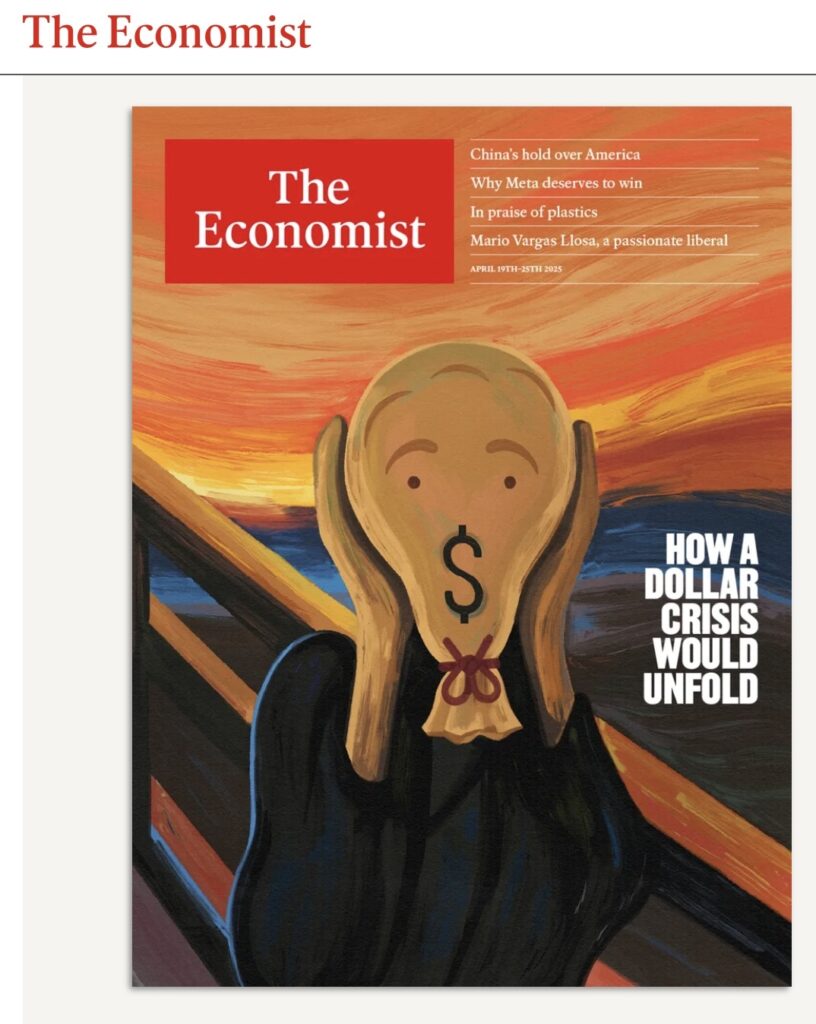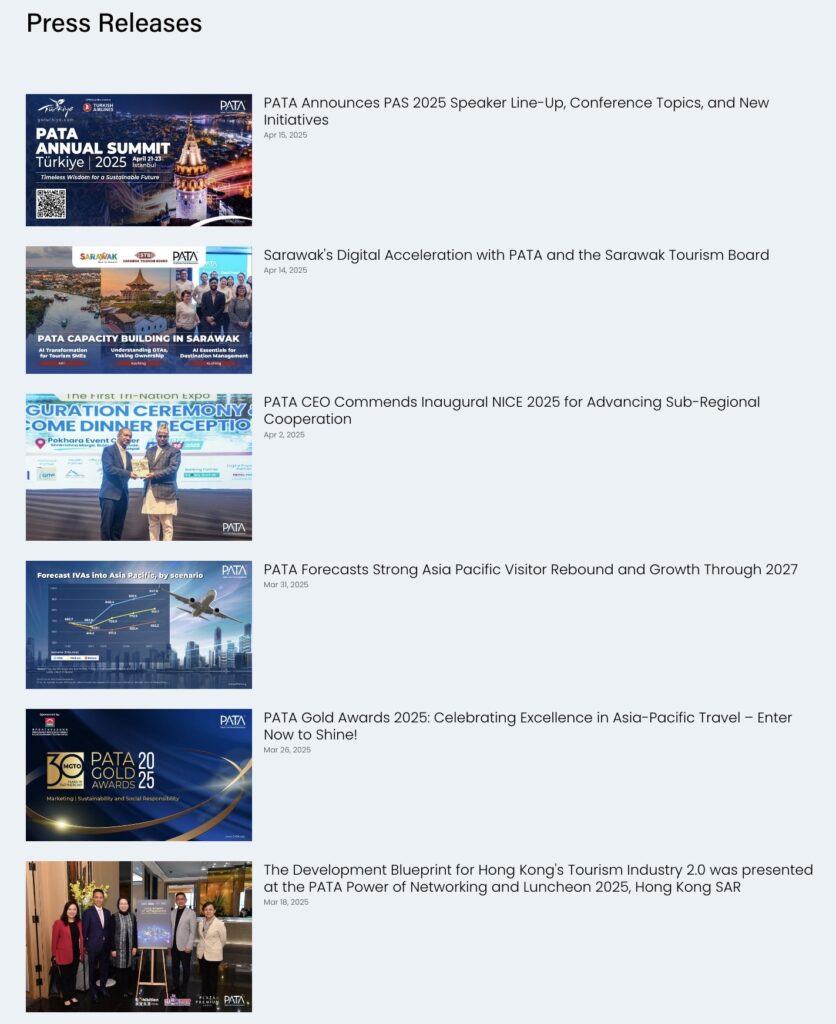21 Apr 2025
From Covid to Chaos, Can PATA Find “Timeless Wisdom” at its Annual Summit?
Bangkok — The PATA annual summit due to open in Istanbul, the commercial capital of Türkiye, at the crossroads of East and West, bears the theme “Timeless Wisdom for a Sustainable Future”. Wisdom is in short supply in this era of chaos and conflict. Barely has Travel & Tourism recovered from the Covid-19 catastrophe, that it has been hit by the Donald Trump virus. With neither a vaccine nor immunisation programme in sight, PATA and the global Travel & Tourism industry at large will need wisdom, lots of it, to cope with this latest round of instability.

Unlike Covid-19, there is no disputing the cause and origins of the Trump virus. It struck at the height of what was an already unstable operating environment — wars in the Middle East and Ukraine, technological disruptions, rising extremism and militarism, declining democratic freedoms, justice and human rights, climate change, growing rich-poor income gaps, tectonic demographic shifts, geopolitical superpower rivalries, and much more. Worse than Covid-19, the Trump virus is turning on itself, like an auto-immune disease. The United States Travel & Tourism sector itself is becoming one of its primary victims.


In the midst of this, what “timeless wisdom” can PATA offer to create a “sustainable future?”
The Oxford dictionary defines “wisdom” as “the quality of having experience, knowledge, and good judgment; the quality of being wise.” While PATA members may have experience and knowledge, which is on ample display in the programme of this week’s Annual Summit, the jury is still out on whether that can translate into good judgment or anything remotely “wise”.
Wisdom also comes with age, a time to look back and reflect. PATA, which will mark its 75th anniversary in 2026, is not very good at doing that either.
Since PATA’s HQ move from San Francisco to Bangkok in 1998, the Asia-Pacific has been hit by a series of external shocks, from wars, conflict, economic crises to natural disasters and health pandemics. All have impacted Travel & Tourism in one way or another. PATA’s inability to weather these storms has resulted in sharply reduced membership and fading influence. Changes in business models and the impact of technology also affected its core value propositions — the prestigious flagship Annual Conference and Travel Mart, once the preeminent annual events of the travel fraternity in the 1980s and 1990s, as well as its Research and Intelligence Centre.
Today, PATA’s finances are stable but precarious. The loss of two important government members in 2023 resulted in lower membership dues in 2024. Attempts are being made to broaden the membership base to include SMEs and popularise PATA among the young generation. But generating critical mass when destinations, companies and Gen Z have multiple other options is a challenging task. The Executive Board, the association’s inner-circle decision-making body, still includes a number of legacy individuals, at least one of whom has been on and off the board since the 1990s.


In the midst of this chaos, PATA members have every right to demand a return on investment for a core purpose of membership: to adopt a strong collective, advocacy position and exercise its voice. This would be the responsibility of its chairman, Mr Peter Semone, an American, who was elected in May 2022 for a two-year term and then fervently pursued an unprecedented two-year extension on the promise of “continuity.” Much of his first term was expended in a bruising battle with the former CEO Liz Ortiguera who was appointed with great fanfare as PATA’s first female CEO in May 2021 and left in February 2023. She was succeeded in September 2023 by Noor Ahmad Hamid, the first born and brought up Asian CEO since the late Mr Lakshman Ratnapala (1992-1997).

In the last two years, Mr Semone’s country of citizenship has been at the centre of geopolitical tensions worldwide, especially in the Middle East and the Asia-Pacific, accused of financially, militarily and politically aiding and abetting the Israeli genocide in Gaza and unnecessarily aggravating trade tensions with China. The Russian-Ukraine war remains a slow-burning fire. Upon winning a two-year extension as PATA Chairman in May 2024, Mr Semone made a statement referring to the “existential threat” posed by growing global geopolitical conflicts. However, he has gone silent since the re-election of Mr Trump in November 2024.
There is nothing on the PATA website or its social media communications channels to show what an association which claims to be the “Voice” of the Pacific Asia travel has to say about Mr Trump’s unilateral imposition of tit-for-tat tariffs, nor what it is advocating in terms of solutions.

The United States is hurting everyone, itself included. Rapidly losing trust, respect and influence, it has become the biggest threat to Asia Pacific travel. The tariffs will no doubt have a serious downstream impact on Travel & Tourism. It is only a matter of time before attention shifts from products to the services sector, specifically the role of US multinational hotel chains, OTAs, credit card companies, consultancy companies, real estate, insurance and finance companies.
If the Trump regime can weaponise tariffs on products, it could very well deploy the vast treasure trove of consumer data in the hands of the services sector for the same purpose. Combined, that poses a serious threat to national security and sovereignty of the PATA region as a whole.

That makes it critical for the people of the Asia-Pacific, especially in membership organisations funded partly by taxpayer money, to know whose side American citizens elected to senior decision-making positions in these organisations, are on. At the PATA summit in Istanbul, all eyes should be on Mr Semone. Is he for us or against us? Mr Semone still has one year to go as Chairman. If the region sinks any further due to the actions of his government, and PATA’s fortunes sink alongside, Mr Semone’s place in history is finished.
On the flip side, if he draws upon the “Timeless Wisdom” offered by indigenous Asian philosophies, he may still be able to create a realistically more “Sustainable Future”. One such wisdom-based philosophy, which he has cited in past public appearances, is Tri Hita Karana (three causes of well-being: Harmony with God and Nature, and Harmony among people), native to Bali, his second home.
Indeed, the global future over the rest of this century will be decided by what happens in the Asia-Pacific. With two-thirds of the world’s population, including the young, the old and women, the Asia-Pacific is home to truly great wisdoms and ways of life. It has enough manpower, brainpower, markets and natural resources to sustain itself and vaccinate/immunise itself against the Trump virus.
If the nearly four billion people of this region travel just within the region, share their wisdoms, knowledge and their technologies and learn to create Alliances of Civilisations rather than fall victim to divide-and-rule rabble rousers on the basis of caste, colour and ethnicity, that will be more than enough. The opportunity for PATA, as the “Voice of Asia-Pacific travel”, to raise that voice and advance its much-touted but seldom-practised advocacy agenda is clear.
Indeed, the current crisis could become PATA’s second calling. The 1998 HQ shift to Asia was primarily designed to take advantage of the then rising “Asian Century.” Emerging from the ashes of the 1997 financial crisis, the region was all set to create a New Normal and Build Back Better. Regional policy makers were conscious of the need to learn the lessons of that crisis. Then came the 9/11 attacks, followed one after another by conflict and instability, pandemics and natural disasters. In each of those crises, Travel & Tourism was very much a part of the recovery and rebuilding process.
The main difference today is that the United States is a part of the problem rather than a part of the solution. Mr Trump wants to Make America Great Again, the rest be damned. His tariffs were imposed on what he famously called “Liberation Day.” The Asia Pacific is responding, some aggressively, others cautiously. Travel & tourism and PATA are both well placed to build on this and facilitate the re-emergence of an Asian Century.
If it can seize the fresh opportunity to harness the region’s timeless wisdom to create a sustainable, peaceful, stable future, the PATA annual summit in Istanbul, at the crossroads of Eastern and Western Civilisations, could prove to be truly historic in more ways than one.
